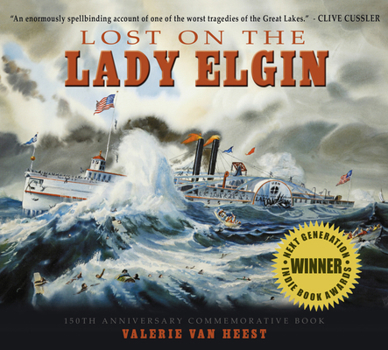Lost on the Lady Elgin: 150th Anniversary Commemorative Book
Lightning tore through the slate-black sky above lower Lake Michigan during the early hours of Saturday, September 8, 1860, illuminating the palatial sidewheel steamer Lady Elgin as she lumbered north from Chicago through raging seas and gale winds. The vessel's perilous journey would end abruptly and tragically when the schooner Augusta collided with the steamer, piercing a gaping and fatal wound in the steamer's port side. Within minutes, the Lady Elgin broke up and foundered, forcing her terrified passengers and crew into the maelstrom. Some drowned quickly; others clung to small bits of wreckage throughout the horrific early morning. Most lost their lives in the churning surf along shore. Over three hundred people, mainly Irish-Americans from Milwaukee's Third Ward, perished in the disaster--the worst maritime tragedy ever on the open waters of the Great Lakes. Newspaper headlines announced the "alarming calamity," survivors recounted their terrifying ordeals, tens of thousands turned out for funerals in Milwaukee, and the tragedy evoked far-reaching effects, including the establishment of a lighthouse and life saving service at Evanston, Illinois. However, the volatile 1860 presidential election leading to the start of the Civil War would overshadow the tragedy of the Lady Elgin's loss, and the memory of the accident faded.
One hundred twenty-nine years after the disaster, the Lady Elgin became headline news again when the discovery of her wreck incited a legal battle over ownership, leading the state of Illinois to conduct a survey, initially directed by the author, to document several areas of debris off the shores of northern Illinois. Award-winning author Valerie van Heest, drawing on an extensive collection of primary materials amassed during and after the survey work on the Lady Elgin, provides a copiously researched historical narrative that recounts the golden age of passenger travel on the Great Lakes on the eve of a pivotal presidential election and describes in detail the terrifying loss of the Lady Elgin as four hundred souls fought for their lives. The 150th anniversary of the Lady Elgin's loss is commemorated by this comprehensive account of the disaster.
Related Subjects
History




